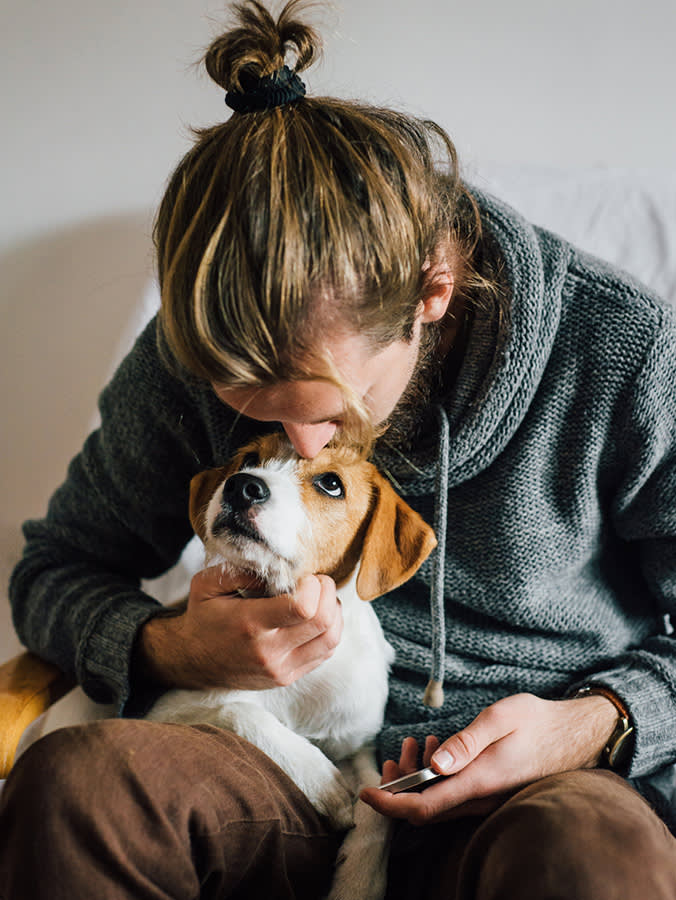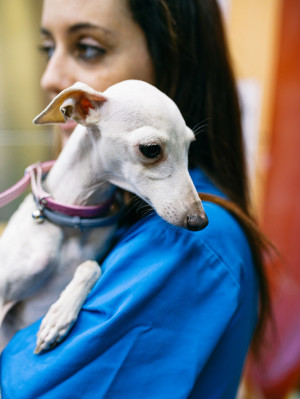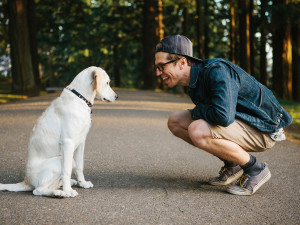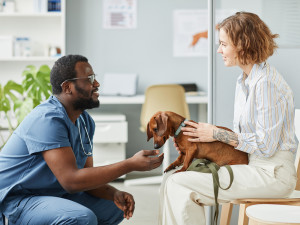A Mysterious Illness Is Making Dogs Across the Country Sick
Get all the info about this highly contagious respiratory illness—including its possible origins.

Share Article
A mysterious new respiratory virus in dogsopens in a new tab has been making pups sick since it showed up in Oregon this August. It has since spread to 12 states with rare cases being fatal, and veterinarians are urging caution — but not panic. In a new development this week, researchers may finally be closer to understanding its origins.
In a genetic sequencing of 30 dogs from New Hampshire who got sick last year and 40 dogs from Massachusetts and Rhode Island who got sick this year, researchers at the University of New Hampshire’s Veterinary Diagnosis Laboratory and the Hubbard Center for Genome Studies found a previously unknown germ. The pathogen likely evolved from a component of the dog microbiome.

Get (totally free) deals for food, treats, accessories, tech, and way more pet parenting must-haves.
opens in a new tabDr. David Needle, pathology section chief at the College of Life Sciences and Agriculture at the University of New Hampshire, told NBC News opens in a new tabthat the pathogen is “a funky bacterium.” It’s smaller than a normal bacterium and can be tricky to find and sequence. Its size may explain why some dogs have become very sick, with some cases being fatal; smaller pathogens can more easily enter a dog’s lungs, which increases the risk of pneumoniaopens in a new tab.
It’s not yet certain that this pathogen is what’s making dogs sick across the country. But if the germ turns out to be responsible, its discovery is the first step in potentially finding medications that can fight what veterinarians are referring to as CIRDC (canine infectious respiratory disease complex) because it has not been responsive to antibiotics.
Which states is the mystery canine respiratory virus in?
Although cases of the respiratory virus first appeared in Oregon, there have since been possible cases in California, Colorado, Florida, Georgia, Idaho, Illinois, Indiana, Massachusetts, New Hampshire, Rhode Island, and Washington.
Because the mystery illness shares symptoms with other canine respiratory infections, it’s hard for experts to know exactly how many cases there have been or where the illness has occurred. And with pups traveling daily — especially during this busy holiday season — it’s difficult to estimate local risk.
“There is no invisible barrier between states, so there is a possibility of spreading to other parts of the country if infected dogs are traveling,“ says Oregon-based veterinarian Dr. Rachel Warnes. But she also stresses that this should not be a cause for alarm. “This disease appeared to peak in August in Oregon, and while cases are still being reported, it is not as common as the media would lead us to believe.“
What are the symptoms of the canine respiratory virus?
The mystery virus is not responsive to antibiotics and can evolve into severe pneumonia, so it’s important to keep an eye out for early symptoms. Signs of the illness are similar to some other canine respiratory issues, such as canine influenza, Bordetella, and parainfluenza. “If your dog is showing any of the following signs: coughingopens in a new tab, excessive sneezingopens in a new tab, nasal or ocular discharge, lethargyopens in a new tab, inappetence, isolate your dog at home and call your vet to make an appointment to be seen,” Dr. Warnes advises.
How can I keep my dog safe?
Vaccination is an important stepopens in a new tab you can take to protect your pup. The Oregon VMA reportsopens in a new tab that most dogs who are vaccinated against respiratory illnesses have more mild cases of CIRDC. Early detection improves a dog’s odds, too, so get your pup to the vet as soon as they show symptoms.
Because the illness is contagious, dogs should avoid gathering in large groups if possible. “There is no real need to be that extreme and keep dogs entirely away from each other since it is crucial to socialize pets,“ says Dr. Pansy Suzuki, the medical director at Veterinary Emergency Groupopens in a new tab. “Pet parents should be cautious and consider smaller playdates with other dogs they know are healthy. There is more risk in a less controlled environment like a dog park.“
Pups should not share communal water bowls, and you should steer your dog clear of any dog with visible symptoms. “If your dog is sick, it is best to keep them at home, regardless of the cause of the illness,” Dr. Warnes says. She adds that holiday travel may contribute to the spread of illness. “Consider having a pet sitter instead of boarding over the holiday when many boarding facilities might be crowded,” she says. “Stressful situations, such as shelters and boarding facilities, can increase the chance of your pet contracting an illness. When our pets are stressed, their immune system is decreased.”
That said, boarding situations are often unavoidable, and there are ways to minimize your pup’s risk even if you can’t find a sitter for the holidays. “If you do need to board your pet, ensure your boarding facility employs strict hygiene measures including vaccine protocols to ensure all pets are up-to-date with vaccines to minimize spread of known respiratory pathogens,” says Dr. Jamie Richardson, the head of veterinary medicine at Small Door Veterinaryopens in a new tab.
Some dogs should take extra caution. “Puppies, unvaccinated dogs, geriatric dogs (especially with other complicating diseases), and immunocompromised pets (on chemotherapy) can potentially be more severely affected than the general population,” Dr. Warnes says.

Sio Hornbuckle
Sio Hornbuckle is a writer living in New York City with their cat, Toni Collette.
Related articles
![Dog laying down in dog bed and coughing]() opens in a new tab
opens in a new tabWhy Is My Dog Coughing?
Seven reasons to be concerned when your dog is coughing.
![dogs at dog park drinking water and playing in pool]() opens in a new tab
opens in a new tabDog Park Etiquette: Dog Park Dos and Don’ts
New kid on the block? Follow this trainer’s tips before letting your pet run wild.
![Young female pet parent consulting with African-American male veterinarian while holding her Doxin dog in her lap]() opens in a new tab
opens in a new tabPet Check-Up: 10 Tips for a Better Vet Visit
Become an advocate for your pet during their vet check-ups.
- opens in a new tab
Reverse Sneezing or Honking Noise in Dogs: Causes and Treatment
Don’t panic: It’s called reverse sneezing, and in most cases, it’s nothing to worry about.
![A beautiful woman lying down in the park hugging her cute little dog.]() opens in a new tab
opens in a new tabCommon Health Conditions in Shelter Dogs That Really Aren’t a Big Deal
Seriously, everything on this list is super treatable.








